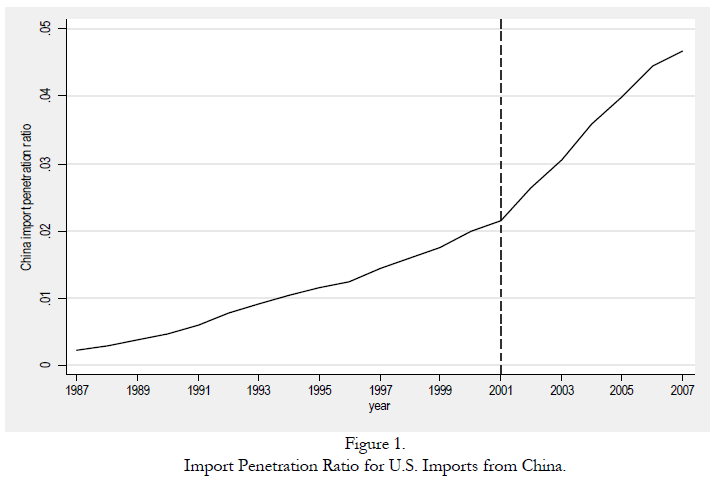A friend was commenting on this post from the other day wherein I hypothesized as to why employment growth was so much slower in the 2000s than in earlier decades. He suggested the sharp acceleration in Chinese imports after their entry into the WTO in 2001.
Well, just by chance I was referring someone to this important paper by Autor et al and I stumbled on this figure of Chinese import penetration into the US, with an awfully clear acceleration, as my friend described.
Autor et al, link above. Their measure here is US imports from China divided by gross domestic purchases.
The paper measures the impact of import penetration from low-wage exporters on US wages, employment, and the extent to which the safety net is invoked to offset these impacts. Trade economists used to argue that trade with low-wage countries was unlikely to be doing much damage to our job market because the magnitudes were too small. But, as authors write, China’s aggressive export-led growth changed that equation:
In 1991, low-income countries accounted for just 2.9% of US manufacturing imports…However, owing largely to China’s spectacular growth, the situation has changed markedly. In 2000, the low-income-country share of U.S. imports reached 5.9% and climbed to 11.7% by 2007, with China accounting for 91.5% of this import growth over the period. The share of total U.S. spending on Chinese goods rose from 0.6% in 1991 to 4.6% in 2007, with an inflection in 2001 when China joined the World Trade Organization.
They also find large negative effects relative to other research on this issue:
Rising exposure increases unemployment, lowers labor force participation, and reduces wages in local labor markets. Conservatively, it explains one-quarter of the contemporaneous aggregate decline in U.S. manufacturing employment. Transfer benefits payments for unemployment, disability, retirement, and healthcare also rise sharply in exposed labor markets. The deadweight loss of financing these transfers is one to two-thirds as large as U.S. gains from trade with China.
US manufacturing employment lost 3.4 million jobs between 2000-07 (which, as shown in the link above, was the slowest business cycle for job growth on record). Autor et al find that more than half of those losses were the result of rising exposure to Chinese import competition. So I think my friend has a point.

